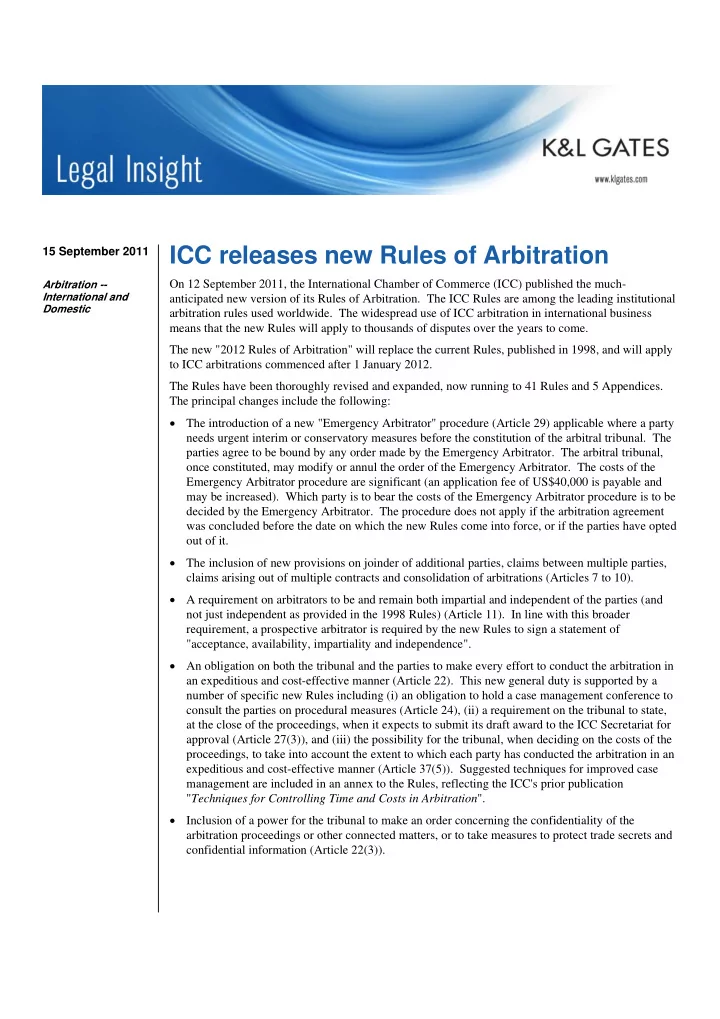

ICC releases new Rules of Arbitration 15 September 2011 On 12 September 2011, the International Chamber of Commerce (ICC) published the much- Arbitration -- International and anticipated new version of its Rules of Arbitration. The ICC Rules are among the leading institutional Domestic arbitration rules used worldwide. The widespread use of ICC arbitration in international business means that the new Rules will apply to thousands of disputes over the years to come. The new "2012 Rules of Arbitration" will replace the current Rules, published in 1998, and will apply to ICC arbitrations commenced after 1 January 2012. The Rules have been thoroughly revised and expanded, now running to 41 Rules and 5 Appendices. The principal changes include the following: The introduction of a new "Emergency Arbitrator" procedure (Article 29) applicable where a party needs urgent interim or conservatory measures before the constitution of the arbitral tribunal. The parties agree to be bound by any order made by the Emergency Arbitrator. The arbitral tribunal, once constituted, may modify or annul the order of the Emergency Arbitrator. The costs of the Emergency Arbitrator procedure are significant (an application fee of US$40,000 is payable and may be increased). Which party is to bear the costs of the Emergency Arbitrator procedure is to be decided by the Emergency Arbitrator. The procedure does not apply if the arbitration agreement was concluded before the date on which the new Rules come into force, or if the parties have opted out of it. The inclusion of new provisions on joinder of additional parties, claims between multiple parties, claims arising out of multiple contracts and consolidation of arbitrations (Articles 7 to 10). A requirement on arbitrators to be and remain both impartial and independent of the parties (and not just independent as provided in the 1998 Rules) (Article 11). In line with this broader requirement, a prospective arbitrator is required by the new Rules to sign a statement of "acceptance, availability, impartiality and independence". An obligation on both the tribunal and the parties to make every effort to conduct the arbitration in an expeditious and cost-effective manner (Article 22). This new general duty is supported by a number of specific new Rules including (i) an obligation to hold a case management conference to consult the parties on procedural measures (Article 24), (ii) a requirement on the tribunal to state, at the close of the proceedings, when it expects to submit its draft award to the ICC Secretariat for approval (Article 27(3)), and (iii) the possibility for the tribunal, when deciding on the costs of the proceedings, to take into account the extent to which each party has conducted the arbitration in an expeditious and cost-effective manner (Article 37(5)). Suggested techniques for improved case management are included in an annex to the Rules, reflecting the ICC's prior publication " Techniques for Controlling Time and Costs in Arbitration ". Inclusion of a power for the tribunal to make an order concerning the confidentiality of the arbitration proceedings or other connected matters, or to take measures to protect trade secrets and confidential information (Article 22(3)).
ICC releases new Rules of Arbitration Changes to the arrangements within the ICC for dealing with challenges to jurisdiction and with the appointment of arbitrators (and the role of ICC National Committees and the ICC Court in that process). The new Rules were produced following a long drafting and consultation process involving arbitration practitioners and ICC members worldwide. The inspiration for the changes to the Rules appears to come from various sources. Some mirror changes made to other institutional rules in recent years which have proved successful. For example, an emergency arbitrator procedure was introduced into both the Stockholm Chamber of Commerce rules and the Singapore International Arbitration Centre rules in 2010, and the ICC procedure follows a similar model. Other provisions formalise changes to the ICC Secretariat's working practice over recent years: an example is the statement of availability, impartiality and independence, which was first introduced in 2009. Alongside those are some genuinely new provisions which are not yet tried and tested in practice. Many are plainly designed to meet the concerns of corporate counsel regarding time, cost and the protection of sensitive information. The new Rules relating to the expeditious and cost-effective conduct of arbitrations will be welcomed, but experience so far suggests that there may be limits to how much institutional rules can accelerate arbitral proceedings. The ICC has devoted considerable attention to providing tribunals and parties with the relevant tools and techniques for controlling time and cost in international arbitration, and the new Rules demonstrate its continued commitment to that goal. Whether it will be achieved in practice remains to be seen, but certainly the new Rules look to be a step in the right direction. The new Rules continue to provide parties to ICC arbitration with valuable flexibility as to the conduct of their arbitrations. Yet the inclusion of more specific procedures and powers heightens the need for parties to be aware of what the Rules provide, in order to avoid agreeing to a procedure or provision that could be contrary to their interests. For example, a party concerned about being the subject of an application for an Emergency Arbitrator may consider opting out of that provision of the new Rules. To view the new Rules from the ICC website, click here. The new Rules will be the subject of review and analysis at the forthcoming ICC UK arbitration conference, to be held on 21 September 2011 at our London office. The conference is entitled " Is international arbitration meeting the demands of its users? ". For further details of the event, click here. Authors: Peter R. Morton peter.morton@klgates.com +44.(0)20.7360.8199 Marcus M. Birch marcus.birch@klgates.com +44.(0)20.7360.8233 2
ICC releases new Rules of Arbitration 3
Recommend
More recommend